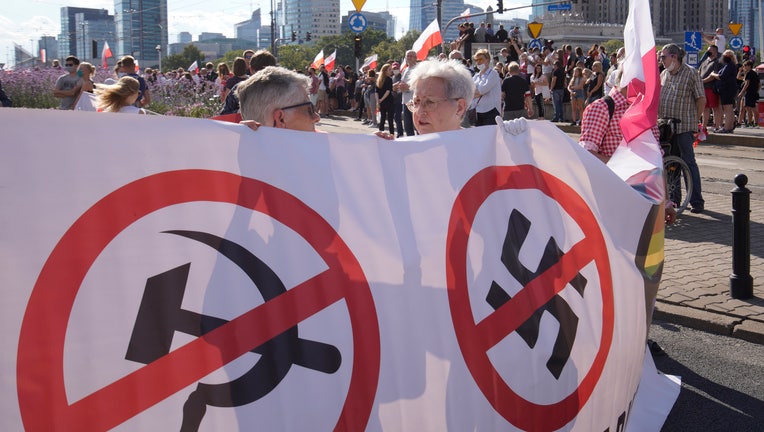Poland wants Germany to pay over $1 trillion in WWII reparations

People are seen holding a bannere with anti-fascist and anti-communist symbols in Warsaw, Poland on August 1, 2020. (Photo by Jaap Arriens/NurPhoto via Getty Images)
Poland’s top politician said Thursday that the government will seek equivalent of $1.3 trillion in reparations from Germany for the Nazis’ World War II invasion and occupation of his country.
Jaroslaw Kaczynski, leader of the Law and Justice party, announced the huge claim at the release of a long-awaited report on the cost to the country of years of Nazi German occupation as it marks 83 years since the start of World War II.
"We not only prepared the report but we have also taken the decision as to the further steps," Kaczynski said during the report’s presentation.
"We will turn to Germany to open negotiations on the reparations," Kaczynski said, adding it will be a "long and not an easy path" but "one day will bring success."
Poland’s right-wing government argues that the country which was the war’s first victim has not been fully compensated by neighboring Germany, which is now one of its major partners within the European Union.
Germany argues compensation was paid to East Bloc nations in the years after the war while territories that Poland lost in the East as borders were redrawn were compensated with some of Germany’s pre-war lands. Berlin calls the matter closed.
RELATED: Putin offers $16,000, honorary 'Mother Heroine' award to Russian women who have 10 children
Top leaders including Kaczynski, who is Poland’s chief policy maker, and Prime Minister Mateusz Morawiecki attended the ceremonial release of the report at the Royal Castle in Warsaw, rebuilt from wartime ruins.
The release of the report was the focus of national observances of the anniversary of the war that began Sep. 1, 1939, with Nazi Germany’s bombing and invasion of Poland and was followed by more than five years of brutal occupation.
A team of some 30 economists, historians and other experts worked on the report since 2017. The issue has created bilateral tensions.
The war was "one of the most terrible tragedies in our history," President Andrzej Duda said during early morning observances at the Westerplatte peninsula near Gdansk, one of the first places to be attacked in the Nazi invasion.
"Not only because it took our freedom, not only because it took our state from us, but also because this war meant millions of victims among Poland’s citizens and irreparable losses to our homeland and our nation," Duda said.
In Germany, the government’s official for German-Polish cooperation, Dietmar Nietan, said in a statement that Sept. 1 "remains a day of guilt and shame for Germany that reminds us time and again not to forget the crimes carried out by Germany" that are the "darkest chapter in our history" and still affect bilateral relations.
Reconciliation offered by people in Poland is "the basis on which we can look toward the future together in a united Europe," Nietan said.
Poland’s government rejects a 1953 declaration by the country’s then-communist leaders, under pressure from the Soviet Union, agreeing not to make any further claims on Germany.
An opposition lawmaker, Grzegorz Schetyna, says the report is just a "game in the internal politics" and insists Poland needs to build good relations with Berlin.
Some 6 million of Poland’s citizens, including 3 million Jews, were killed in the war and its industry, infrastructure and culture suffered huge losses.

